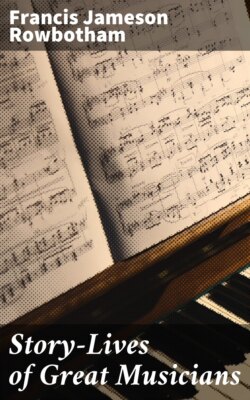Читать книгу Story-Lives of Great Musicians - Francis Jameson Rowbotham - Страница 7
На сайте Литреса книга снята с продажи.
Оглавление'The King exclaimed repeatedly, "Only one Bach! Only one Bach!"'ToList
Considered apart from his works, the life of Sebastian Bach stands out as a noble example of untiring industry and perseverance; but we miss the brilliancy and fire which in the case of many other great musicians have served to render their lives so outwardly striking and marvellous. The genius of Bach was a mighty power working unseen, buried beneath a simple exterior. Unlike Handel, that other great master of his time with whom he has been so often compared, Bach lived a life of comparative retirement, never travelling beyond the confines of his own country, making no bid for popularity, and to the last remaining unaffected by praise or censure. All his life long he was seeking knowledge and truth, never contenting himself with a belief in his own unaided powers or judgment, but always showing the keenest interest in the progress of his art as evinced by the works of other musicians of his day. One little instance will serve, perhaps, to bring out clearly this marked difference between these two great men: Bach was truly desirous of making Handel's acquaintance, and tried on several occasions to gratify this wish. On the last occasion he travelled to Halle on learning that Handel was revisiting his birthplace from the scene of his triumphs in London, only to find on his arrival that his contemporary had departed for England earlier in the day. Handel, on the other hand, is not known to have expressed the least desire to meet the man whose fame rested upon so solid a foundation of excellence. The one was self-centred, the other wholly centred upon art for art's sake—yet both were great.
It is convenient to speak of Bach's life as having been divided into three stages or periods, each marked off from the rest by the nature of the works to which it gave birth. Thus, the Weimar period is that to which is assigned the major portion of his organ music. The Cöthen period, on the other hand, produced few compositions for the organ, but was mainly devoted to instrumental chamber music; whilst to the Leipzig period belongs the production of nearly all his finest Church compositions.
Bach was laid to rest in the churchyard of St. John's Church at Leipzig, but neither stone nor cross exists to mark the spot. Only the register of deaths preserved in the town library remains to tell us that 'A man, aged sixty-seven, M. Johann Sebastian Bach, Musical Director and Singing Master of the St. Thomas School, was carried to his grave in the hearse, July 30, 1750.'
